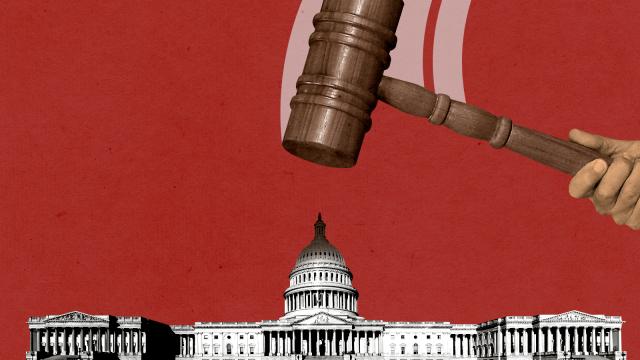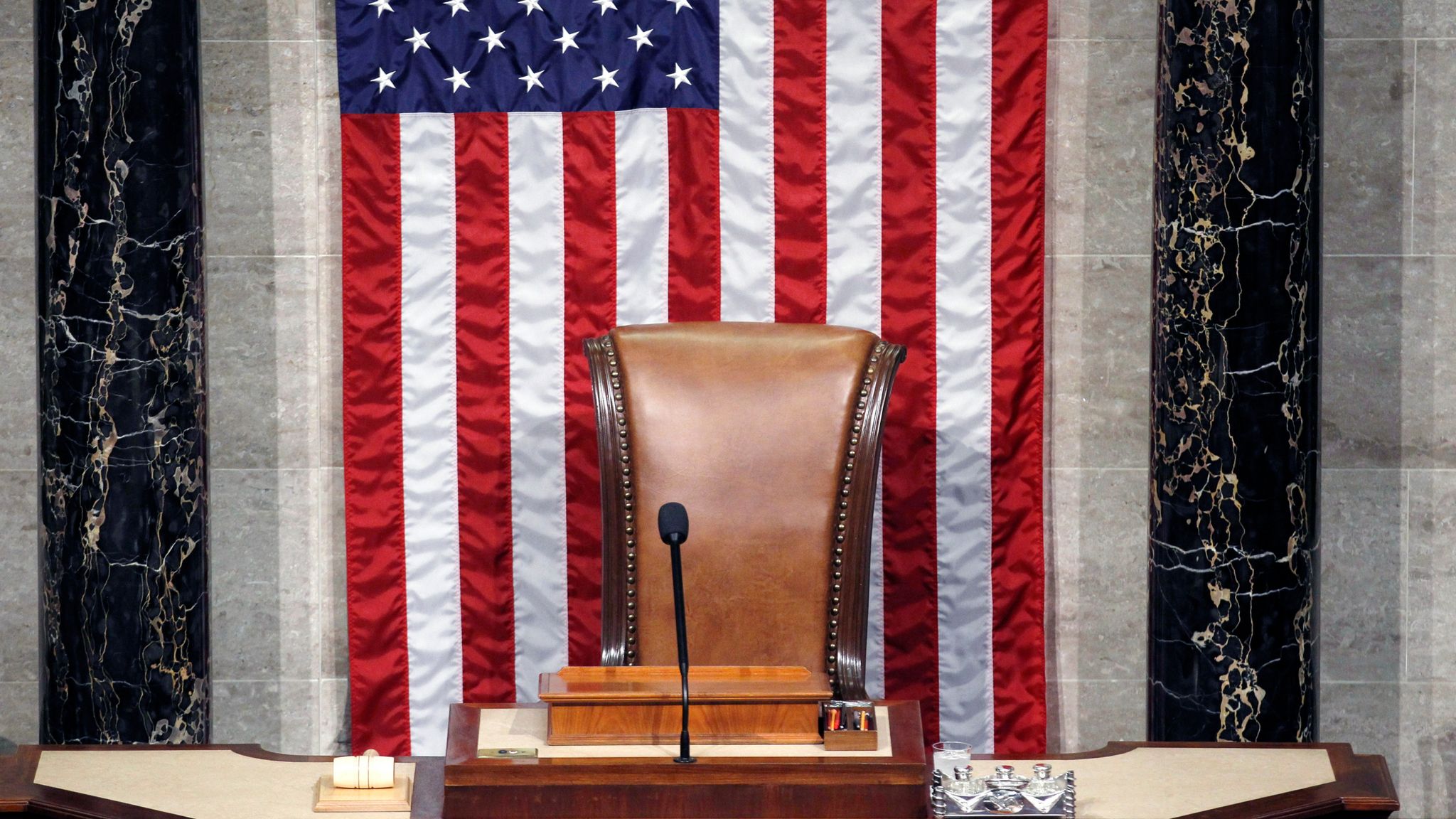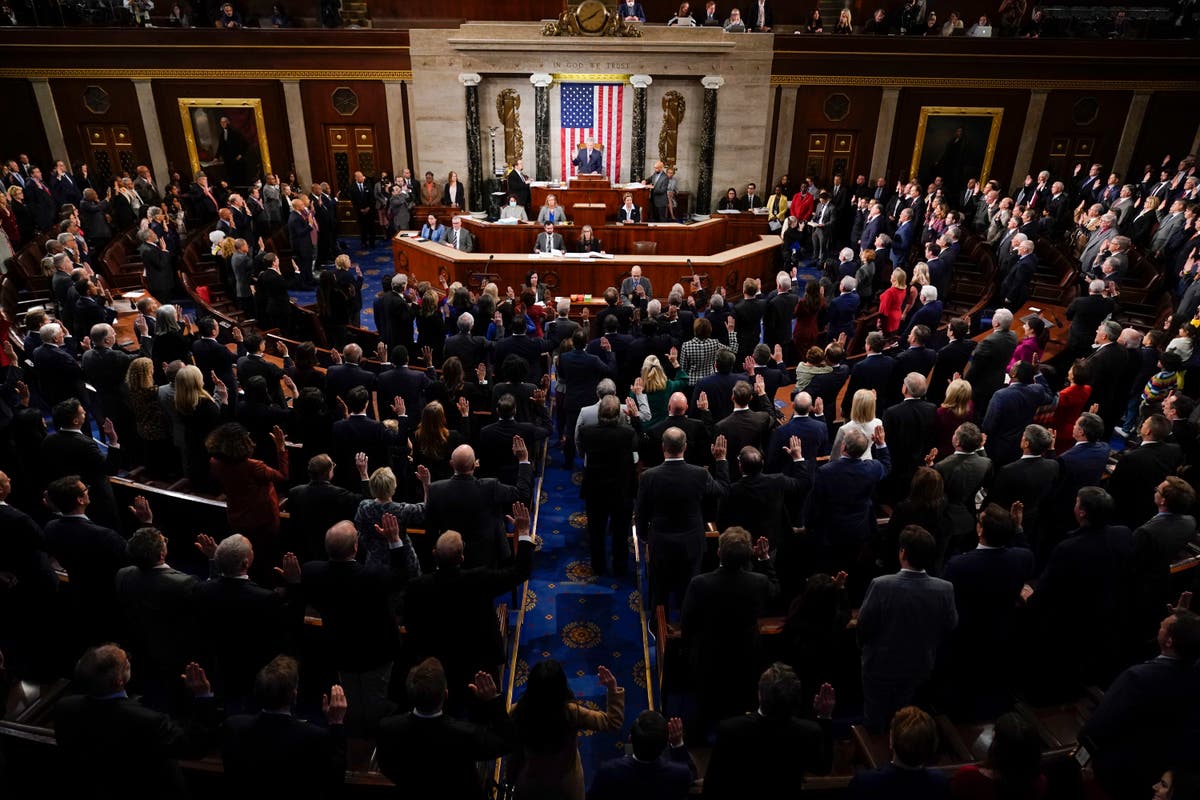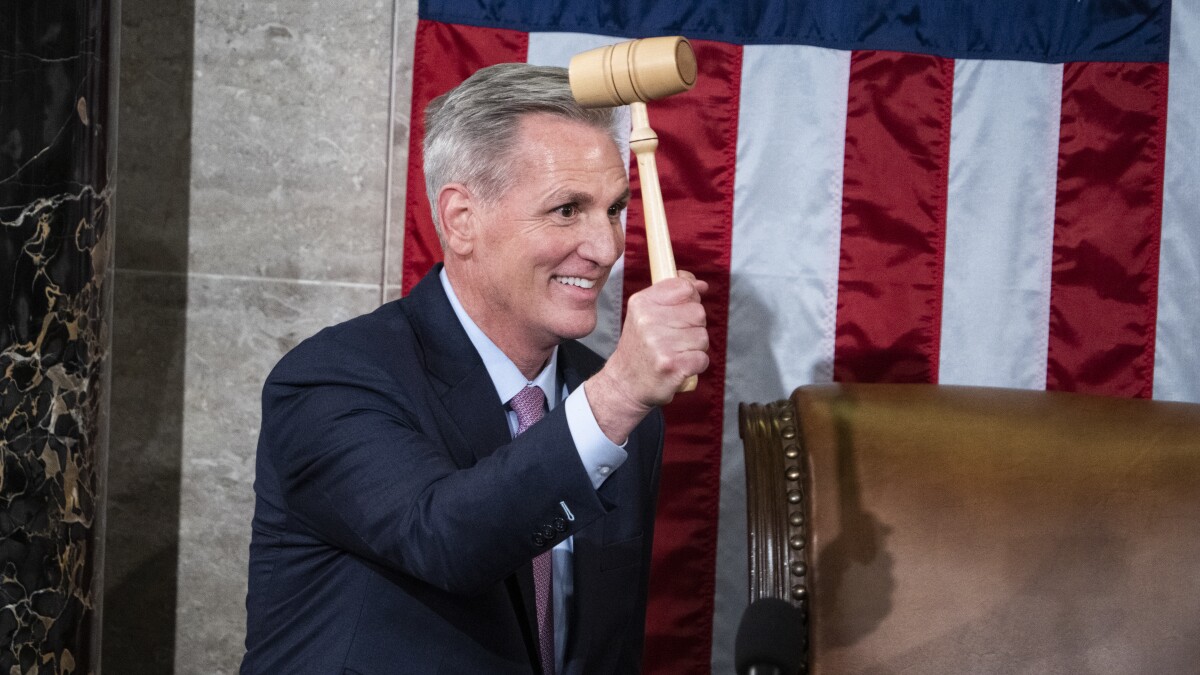
After 15 ballots, Rep. Kevin McCarthy (R-California) was finally elected Speaker of the House last week after placating the extreme right-wing faction of an already extreme right-wing party. Some of the concessions McCarthy made to opponents—like Reps. Lauren Boebert (R-Colorado) and alleged sexual predator Matt Gaetz (R-Florida)—included proposed rules changes, assignments on high-profile committees, and various promises to the extreme right-wing House Freedom Caucus.
According to The New York Times, one of the more controversial rules changes is allowing a single member of Congress to motion to “vacate the chair,” effectively triggering a vote of no confidence in the speaker, allowing for their quick ouster. Such a motion used to require a majority of members to trigger a snap vote, but now any single member can trigger a vote. And due to the slim majority Republicans hold in the House of Representatives, McCarthy can only afford to have 4 defections from his stable of supporters before losing the speaker’s gavel. This could easily pave the way for McCarthy to cave to the most rancid elements of his party on virtually any issue so he can maintain his hold on the speakership.
Liberals and the left enjoyed the schadenfreude experienced from watching the Republican Party battle with itself since January 3, but this trend of appeasing a toxic minority of representatives could prove dangerous not just for the business of governing, but for democracy itself.
Holding the global economy hostage
In the 118th Congress, Kevin McCarthy will have the unenviable job of convincing 218 of 222 House Republicans to back him on must-pass legislation. This includes raising the debt ceiling and major spending bills, if he wants to avoid things like the US defaulting on its debt or another crippling budgetary standoff like the 35-day government shutdown of 2018-2019.
As the Center on Budget and Policy Priorities wrote in a detailed report assessing the implications of a debt default, the possibility of the US defaulting on its debt obligations wouldn’t just impact the US economy: Creditors would doubt the trustworthiness of the US as a debtor, the dollar’s standing as a global reserve currency could be jeopardized or even replaced, the Treasury securities market could be seen as too volatile of an investment on the global market, and federal borrowing costs could climb. This would undoubtedly hike interest rates even further, making it even more difficult for working-class Americans to make large purchases like homes and vehicles.
If the US government couldn’t borrow, it would have to make steep spending cuts to social welfare programs, which could cost potentially millions of jobs and even trigger another recession, according to the CBPP:
Some households, businesses, and nonprofits would be unable to pay their bills while they waited for payments the government legally owed them. Cuts in grants-in-aid would strain the budgets of state and local governments. Such a large drop in spending would plunge the nation into recession and drive up unemployment. The Treasury’s inability to borrow would make it impossible for the federal government to use countercyclical fiscal policy to stimulate the economy or mitigate the hardship faced by those losing their jobs or benefits because of the sharp curtailing of government spending.
There are several ways to make raising the debt limit a more stable process further removed from partisan grandstanding. A 2015 report by the Government Accountability Office suggested three potential options for Congress to explore:
-
Linking debt threshold increases to omnibus spending bills, making the process more streamlined and tied to each new federal appropriations package.
-
Allowing the executive branch (of which the US Treasury Department falls under) to increase the debt limit on its own, with Congress having the option to cast a vote of disapproval if it so chooses.
-
Giving the executive branch broad authority to increase the debt limit as it sees fit. This doesn’t remove the authority Congress has in writing appropriations bills and spending whatever money it deems necessary to fund the government – rather, it just ensures that the US will never default on its debts assuming the Treasury Secretary and the President both want to maintain the US government’s good standing in global markets.
However Congress chooses to proceed, it’s clear that if the 20 hard-liners that refused to back McCarthy’s speakership on the first dozen or so ballots are in a position to endanger the global economy, taking action to make raising the debt limit more stable will be a necessity over the next two years.
Holding the democratic process hostage
While all 435 House seats are up for reelection every two years, every other speakership election will take place in the aftermath of a presidential election. This means that Congress’ Constitutional obligation to certify the Electoral College count could potentially be held hostage if there are lengthy standoffs over the speaker’s gavel in the future.
As the Congressional Research Service notes, choosing who will fill the office of Speaker of the House is the first order of business every new Congress must conduct. The Speaker is responsible for swearing in all members of the House, meaning representatives are not officially members of Congress until the Speaker of the House has been elected. This means the body is unable to take any action on passing new rules or taking up important legislation without a speaker.
Every four years, Congress must certify a presidential election, so in the event that a Democratic president is awaiting certification and a Republican majority controls Congress, that majority could feasibly stall certification if it wants to squabble over its next speaker. This could give a Republican presidential candidate more time to mount more challenges to election results in courts, attempt to convince enough state legislatures to send alternate slates of electors that would vote against the will of that state’s voters, or attempt another outright putsch like the January 6, 2021 attack on the US Capitol.
The Electoral Count Reform Act of 2022, which was passed with the most recent spending bill, was meant to avert another January 6-type event, and some of its provisions will help. Namely, it specifies that a full fifth of the US House of Representatives and US Senate must object to a state’s electoral slate before it can be called into question, as opposed to the former rule that just one member could trigger an objection. It also specifies that the Vice President’s role in conducting the certification process is purely ceremonial and does not grant the Vice President broad authority to decertify an election. It also strikes an 1845 law allowing a state legislature to override their state’s respective popular vote by vaguely declaring a “failed election.”
These measures are an improvement over the status quo, and Democrats have a large enough minority to head off future democratic crises if they’re savvy enough to convince five Republicans to vote with them should such an event occur. Targeting older Republicans who are presumably close to retirement, or peeling off five of the 19 Republican members of the more moderate, bipartisan House Problem Solvers Caucus, could feasibly give Democrats a slim enough majority to elect Minority Leader Hakeem Jeffries (D-New York) as speaker for the purpose of conducting essential governing business.
Republicans are more fractured and divided than they have been in recent memory, and Democrats have the benefit of being a unified bloc that’s almost as large as the majority. Even though Republicans’ capacity for slowing down the gears of governing is high, Democrats – who still control the US Senate and the presidency – have options. The next two years will require them to act strategically in order to stave off the worst parts of a Republican majority.
Carl Gibson is a freelance columnist whose past work has been published in CNN, The Guardian, The Washington Post, Barron’s, Business Insider, The Independent, and NPR, among others. You can view a fuller body of his work here.


















